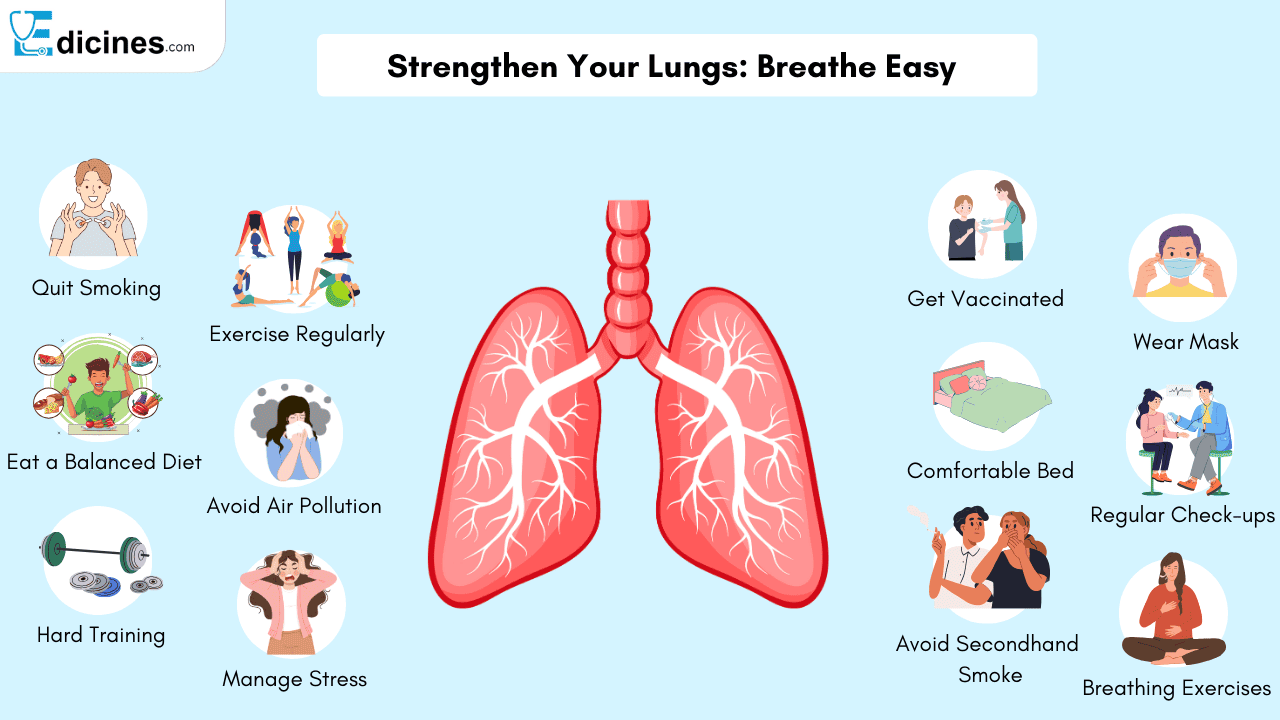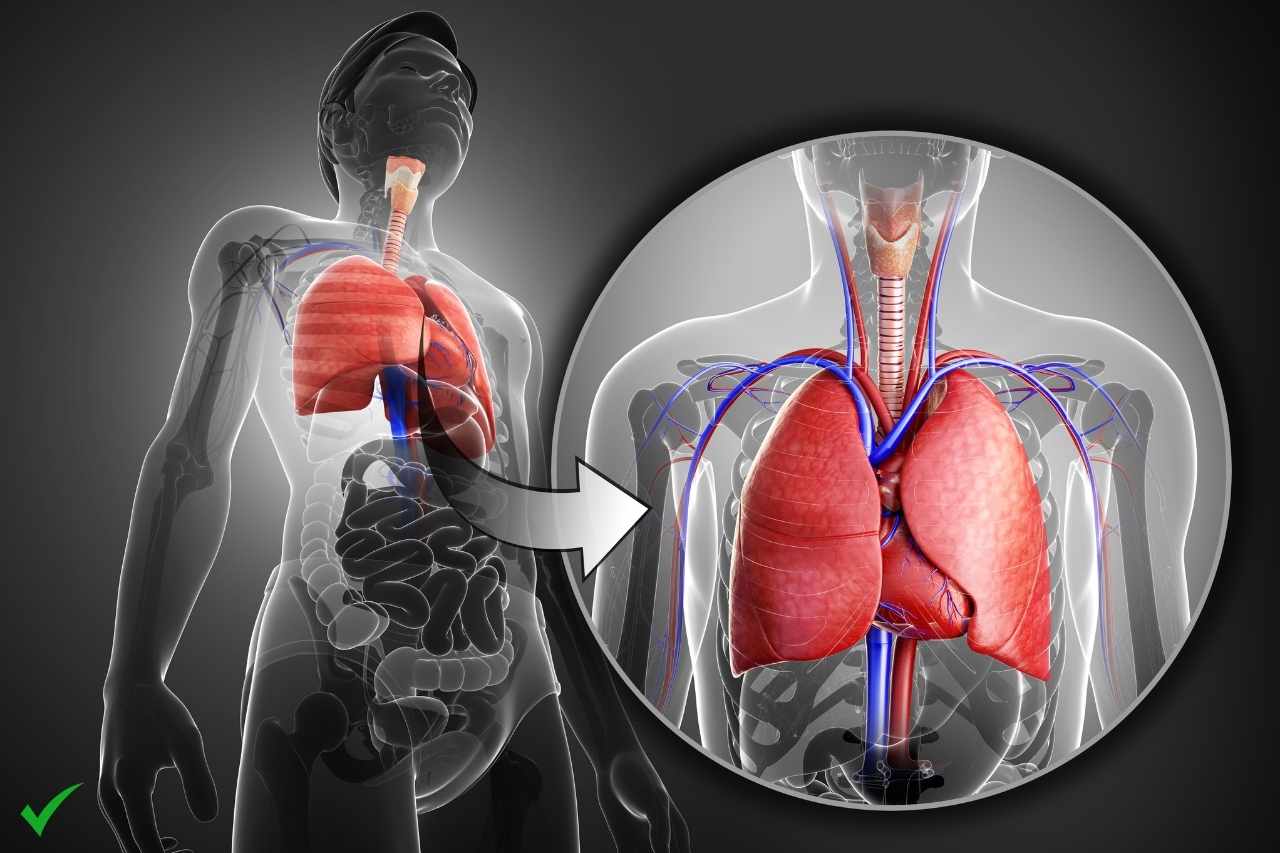Every person wants to live a long, healthy life. Well-functioning lungs are essential to improve lung health, as they allow the body to take in oxygen, support various bodily functions, and enhance the performance of other systems, such as the cardiovascular and immune systems. Most importantly, healthy lungs significantly improve the quality of life. When lung health is compromised, a range of conditions can arise, including asthma, chronic obstructive pulmonary disease (COPD), and bronchitis, all of which can interfere with one’s enjoyment of life. In this article, we will explore various approaches to improve lung health and prevent respiratory problems.
Why Lung Health is Important

Essential for Breathing
Lungs are vital for the process of breathing since they are responsible for the inflow of oxygen into the blood and outflow of the waste gas, carbon-dioxide from the body. This is very important because oxygen is needed in all enzymes, cells, tissues and organs.
Relation to the Health of the Cardiovascular System and the Immune System
Healthy volume of lungs ensures enough oxygen concentration in the blood which helps in a strong healthy heart and vascular system. Moreover, working lungs enable the body’s immune system in fighting off the agents of diseases and infections.
Common Respiratory Issues
It is worth noting that diseases such as anemia, COPD (Chronic obstructive pulmonary disease), and chronic asthma are among the most commonly diagnosed chronic conditions.
By improving the functioning of the respiratory systems, we have the possibility of controlling the occurrence of these problems; and controlling the signs.
Also Read: Chronic Disease Prevention: Strategies for a Healthier Life
1. Quit smoking
Smoking is Harmful to the Lungs
The use of tobacco is a leading cause of lung impairment. Besides containing more than 7,000 chemicals, cigarette smoke is highly toxic to lung cells.
Risk factors are also associated with extensive periods of smoking which includes lung cancer, chronic pulmonary obstructive disorders, and chronic bronchitis.
How to Quit
It is never easy to quit smoking; nevertheless, there are several ways that can make it manageable. Think about using nicotine replacement therapy (like nicotine patches or gum) to alleviate cravings. Counselling and support groups provide assistance that has to do with emotions and psychology during the process of quitting and helps remain on course.
Why Stop Smoking Implies More Benefits Than Risks
After some time, if one resolves to quit smoking, the healing process of one’s lungs tends to commence and even if one has been a chronic smoker for decades past. Some studies show improvement in the extent of damage to lung tissues; there is enhancement of lung volumes, incidence of pulmonary malignancy and other respiratory diseases is lower. As time goes by, it gets easier to breathe and a considerable amount of lung health gets better.
2. Engage in Regular Cardio Exercises
The Best Practices for Lung health
Non-resistance aerobic exercises promote deep and controlled breathing lungs and increase the abdominal respiratory muscles efficiency. Simple everyday activities like staying on one’s feet for long periods of time, walking, swimming or jogging as well as cycling strengthen the lungs to facilitate the provision of oxygen better.
How it Helps the Lungs
Control of Breath while performing is called an aerobic exercise whereby the lungs are able to work in a more efficient way and oxygen supply within the body gets better. With this kind of enhancement in lung capacity, the heart and the muscles can receive more oxygen thus minimising the chances of breathlessness while performing activities that are physical.
Exercise Intensity
Aim to engage in moderate-intensity cardiovascular exercise for at least 30 minutes a day, five days a week. Such a routine will not only help in the preservation of healthy lungs but also re-educate healthy lung functions in the course of time.
3. Make Use Of Breathing Exercises
Deep Breathing
Once again, breathing exercises like controlled or diaphragmatic breathing can be beneficial in increasing ventilation and oxygen supply thanks to increased lung capacity. This technique requires the use of lungs, where all the air is drawn in through the diaphragm which enables more oxygen to come in.
Also Read: Breathing Techniques to Reduce Stress
Pursed Lip Breathing
This technique is aimed at relieving breathlessness by preventing the quick release of exhaled air. One can use this technique by inhaling through the nose and exhaling pursed lips to prevent the air passageway from collapsing for easy oxygen inhalation.
Include Breathing Exercises in Your Regimen
The most active breathing exercise in wind instrument practice is often easy to draw most practising wind instruments into their daily schedule. It has been proved that a daily five-minute session of breath by bronchi opening training significantly improves the functioning of lungs and promotes healthy respiratory system as a whole.
4. Don’t Expose Yourself To Air Pollutants
Indoor Air Quality
These include various factors which when considered within a confined building can help in enhancing or deteriorating the lung health of its inhabitants. One should avoid cleaning surfaces and using different products which normally emit chemical fumes and use UV light air sterilisers.
Outdoor Air Quality
There are environmental exposures such as emissions from cars and industries, dust, and pollen that can provoke the respiratory system. Remain indoors whenever there are high levels of air pollution. Cover your face if you have to go out, especially in highly polluted environments, in order to cut down on the intake of harmful elements.
Impact of pollution
Individuals who reside in cities and other heavily industrialised regions are afflicted with a variety of respiratory diseases, including asthma and COPD, due to several years of being exposed to dirty air. Reducing contamination can also minimise the risk of exacerbating existing respiratory problems and the development of new ones
5. Stay Hydrated
Function of Hydration
Hydration is one of the essential keys to keep the lungs and the respiratory system healthy. Water serves to reduce the viscosity of the mucus present in the lungs, enhances exhalation, and assists in expelling toxins and irritants. It is very important to note that adequate volume of water in the body enables the optimal performance of the whole respiratory system.
Adequate Water Intake
For maintaining proper functioning of your lungs, you should drink at least eight glasses of water a day. Hydration assists in the moisture retention of the airway and counters the thickening of mucus, which is often hard to expel.
6. Eating Healthy Foods
Food Related to Lung Health
A diet containing the proper food substances is essential for the restoration and health of the lungs. Such foods which include antioxidants and vitamins such as vitamin c and d, omega 3 fatty acids are protective of the lungs and help in lowering cellular stress.
Nourishing Foods for the Lung
To this mix, add foods like green vegetables, fruits like berries, nuts, seeds, and fish such as salmon. These foods contain nutrients which help keep the lungs healthy and prevent respiration related problems.
Nutritious Meals
Proper meals are not beneficial only to the lungs but also to the rest of the body. Eating a range of fruits, vegetables and cereals helps in the boosting of the immune system which helps the lungs during infections and inflammation.
Get Regular Medical Checkups
Early Detection of Lung issues
It is necessary to go for check-ups more often to ensure all medical problems including those of the lungs have been dealt with at the right stages. With special regard to illness such as asthma, COPD, or infections of the lungs, early mitigation is key in ensuring that such illnesses do not progress.
Monitoring the lungs
This procedure, along with other tests, measures lung capacity, with the aim of understanding the work performed by the lungs. These screenings help in the early diagnosis of any deterioration of lung function and treatment or modification of the lifestyle which may be required.
Visit the physician
If you have any respiratory symptoms including the inability to breath, a persistent cough, or wheezing, it is advisable to see a physician. Your doctor may advise specific measures aimed at promoting lung health and controlling the disease if there is one.
Conclusion
There is no doubt that healthy lungs contribute to one’s general well-being. Thus, measures have to be taken to eliminate the chances of developing any respiratory disorders. Respiratory practices such cardio and breathing exercises, giving up smoking, wearing breathing masks in polluted areas, drinking plenty of water, eating healthy foods and check-ups are some of the things you do to ensure your lungs are active and fit.
To optimise lung health, contact your doctor for professional assistance. Adapting these recommendations will make a difference for a long time and help you enhance the function of your respiratory system in general.













